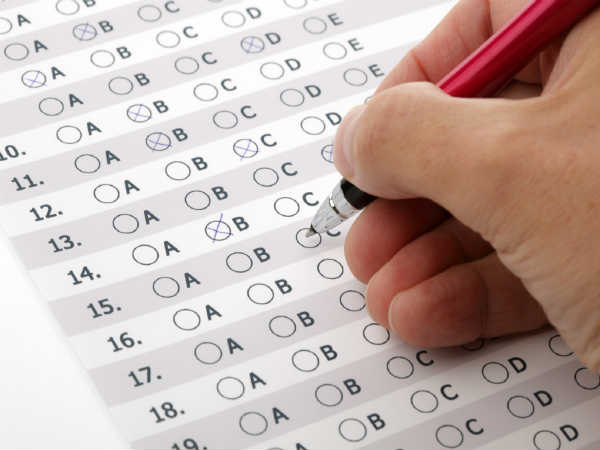Dr. Gyan Pathak
All competitive exams in India, on the surface level, may seem to be doing justice to all the candidates, but in reality they are doing injustice to the poor, underprivileged, and unprivileged. They are being excluded systematically from getting better opportunity in education and jobs. Since these weaker sections of the society are hardest hit by the COVID-19, the vulnerability of their sons and daughters has become historically high because they have lost access to those little facilities and resources that were available to them before the pandemic.
How competitive examinations are eliminating the economically and socially weaker sections from getting better opportunities in education and job can be seen everywhere in the country because it is a widespread phenomenon. The voices and grievances of these sections are not heard by the policy makers. Now an Ex-Judge from Tamil Nadu has official submitted his report to the State Government and explained how poor are being eliminated by NEET. It would just serve as an example to understand what is actually happening in the name of competition.
“NEET Eliminates Poor”, the former judge of the Madras High Court Justice A K Rajan said in his report. It should be noted that the NEET is conducted to select candidates for admission in various medical colleges in the country, but Justice Rajan has said that if it continues, Primary Health Centres in the rural Tami Nadu will not get doctors in future.
The competition system for medical entrance in India has all along been adversely impacted the availability of doctors in India in general and the rural India in particular, the fact which is already well known. The students from the rich and resourceful backgrounds garner maximum seats and only a handful are left for weaker sections. Then after completion of medical studies in India, many of the privileged students leave the country and go abroad for higher studies and get settled there. It creates shortfall in India. The students we educated finally left us, and that too in very large numbers, while we are reeling under acute shortfall of doctors in the country. Majority of the doctors settle themselves in the cities and towns, and very large number of our hospitals, health care centres, and subcentres are being run without doctors or the doctors visiting for very short time on irregular basis.
Justice Rajan’s report in this backdrop should be eye opener, especially when we have been witnessing shortfall of doctors in the country which has been exacerbated by the COVID-19 crisis. “NEET drives away the poor, only the rich and the affluent garner most seats. When you remove local students (students for Tamil Nadu) from studying MBBS, after becoming doctors affluent people are not going to serve in PHCs in remote areas. They will go abroad to continue studies and look after their life,” Justice Rajan has said.
Justice Rajan has talked about Tamil Nadu because he was in the panel constituted by the Tamil Nadu government to study the impact of the NEET on the state and on the students there, and to make necessary recommendations to safeguard the interest of students from backward sections. After examining about 86,000 representations, the panel has prepared the report. Justice Rajan has said that the system was causing irreparable damage. Despite reservation, the poor and rural students have not benefited equally as they are unable to afford private coaching unlike urban affluent students. There are also no coaching centres in rural areas, Justice Rajan has said in an interview to the NDTV.
Before NEET became mandatory, a higher number of students managed to get admissions though they came largely through Government schools. Today, poor students are increasingly not applying for NEET out of fear that they will not make it as the test is based on CBSE, a different curriculum, said Justice Rajan. Additionally, he said that NEET furthers rote learning.
The anomalies in our system of competitive exams is thus well highlighted, though only for NEET with special reference to Tamil Nadu, it applies to all competitive exams and to all states. The syllabi of the competitive exams are not the same as are being taught in various state and boards. Majority of the weaker sections are taught different things and are asked different things in the competitive examinations.
Fairness of competing has a necessary presumption that competition should be conducted between similar. Organising competition between those who have all the access to resources and facilities and those who don’t have any access at all or only limited access. Weaker sections even lack access to books and other study or writing material, while privileged ones get everything. Thus the competition between the privileged and the weaker is unfair. The present system is excluding the weaker sections systematically.
COVID-19 crisis has exacerbated the situation. Access of the weaker sections to the resources and educational facilities has been drastically reduced. The digital divide is now more pronounced. Weaker sections lack access to computers and internet, but competitions are increasingly been held online. During the pandemic, weaker sections could not even access online classes or study material, while the privileged one had not only access to the online classes but also had private access to qualified teachers and study material. Lack of resources for study or access to education may put them behind privileged ones, and would not be able to get equal opportunity in education and jobs.
Exclusion of the poor, underprivileged, and unprivileged must not continue, because we have all along been boasting about adopting an inclusive model of growth and development. Revamping the competitive exams on the principle of justice and equality can be a part of the answer. It seems we will also need to revisit provisions of reservation for the economically or socially weaker sections and provide all facilities to enable them to access equal facilities as the privileged ones for a fair competition. (IPA)
Trending Now
E-Paper


